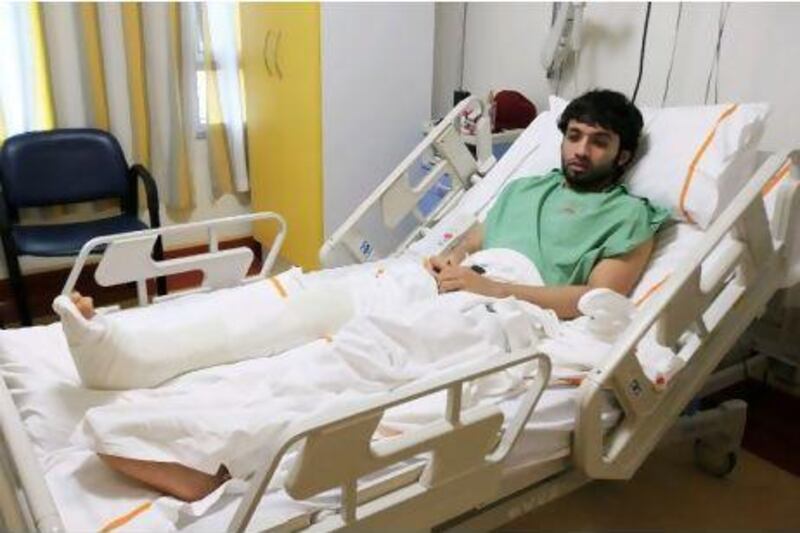DUBAI // Gang violence is becoming more common and more vicious in the city's low-income neighbourhoods, residents say.
The gangs of jobless youths are said to use swords, axes and knives in their fights, which are a particular concern in Satwa and Al Quoz.
Residents say the gangs are made up of youth from low-income and troubled families, and are divided along neighbourhood lines.
While police say the problem is not widespread, two cases in the past month have heightened residents' fears.
In one incident an Emirati man was attacked in Al Warqa by two masked men. In the other incident, Mohammed Ebrahim, a 21-year-old Emirati bank employee, was attacked by six people armed with axes and butcher's knives as he met a friend outside his house in Al Quoz.
Mr Ebrahim has been in hospital since the attack three weeks ago, being treated for several deep cuts he sustained as well as a dislocated knee and an unspecified head injury.
"They were in three cars and they came towards me and before I knew it they started attacking me," Mr Ebrahim said from his hospital bed. "I tried to run away but they hit me with an axe on one of my shoulders.
He said that he did not know his attackers but had heard of their names as they were infamous for fighting and taking drugs in Satwa, where his grandfather lives.
He said he no longer felt safe in the area and urged authorities to take stricter measures to control the problem, which he said was growing.
His uncle, Yacoub Ali, who works at the registration department at Rashid Hospital, agreed that gang fights were a growing trend. "Every week or two we are receiving people into the trauma centre who have been attacked by these gangs," he said.
Mr Ali said that most gang victims knew their attackers but did not dare to identify them for fear of retaliation. He said the gangs were divided along neighbourhood lines.
"In each neighbourhood there is one or two of them and many of the fights happen in retaliation between those groups.
"The real cause of the fights are never known but the members of these groups are always under the influence of drugs and alcohol," Mr Ali said.
Police insist there is no systemised gang fighting in Dubai and say that such attacks should be treated as isolated occurrences.
"These are individual cases and it is not a widespread practice," said Colonel Mohammed Nasser, deputy head of the Criminal Investigation Department of police station affairs.
Many residents disagree. Eisa Ebrahim, a 22-year-old Emirati salesman who has lived in Al Quoz for six years, said there were fights "almost daily" in his area of Sha'abiyat Hamadan and that "some get really bloody".
"There is a known gang in the neighbourhood which is involved in the majority of these fights," said Mr Ebrahim.
The gang, he said, consisted of men in their mid-twenties who cruise around in convoys of seven to eight cars. "They sit near the houses and attack whoever they do not like," he said.
Mr Ebrahim said people were too scared to report the incidents. "Some are afraid of retaliation and others want to take revenge themselves so they do not report it to police," he said. "The cases that are reported are reported by the mothers, sisters or wives."
Eisa Asafi, a 26-year-old Iranian hospital administrator who has lived in Al Quoz all his life, said the problem became noticeably worse when residents of condemned buildings in Satwa moved to the area about five tears ago.
"Before we hardly saw any fights but since people from Satwa moved here, the fights started happening," he said. "I do not feel safe anymore. Families are always worried about their small children."






